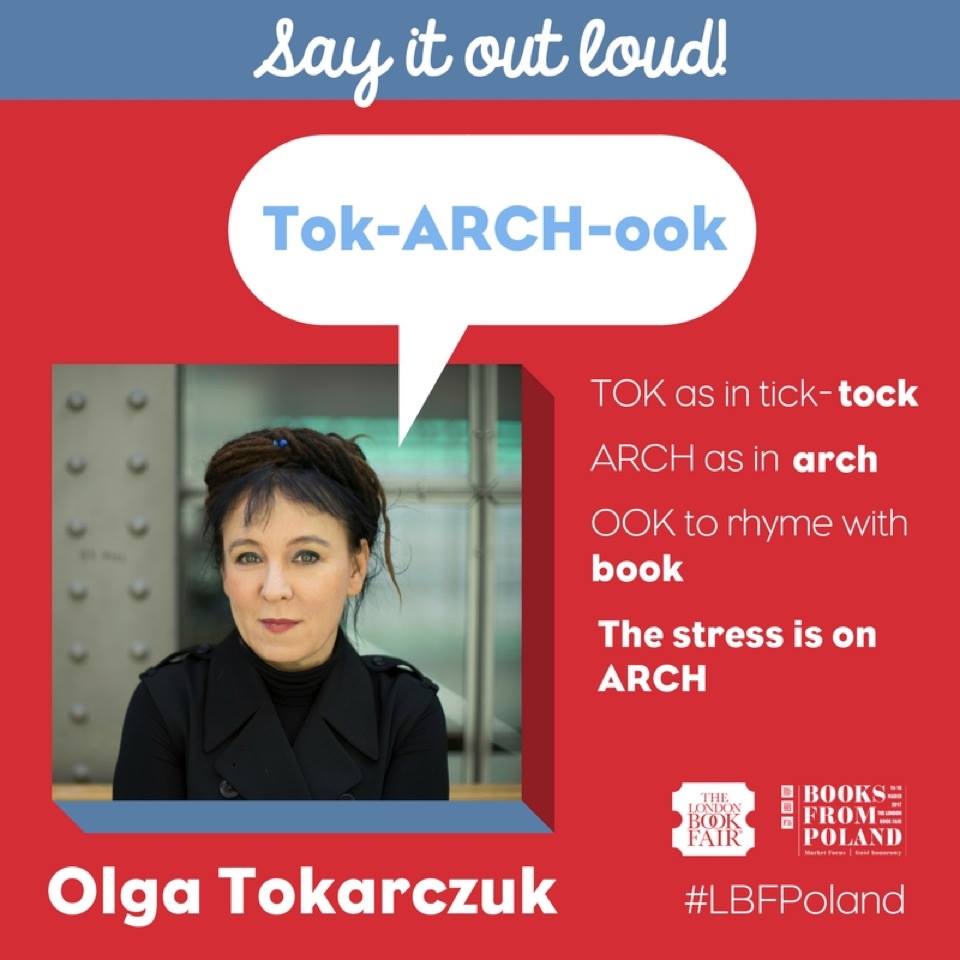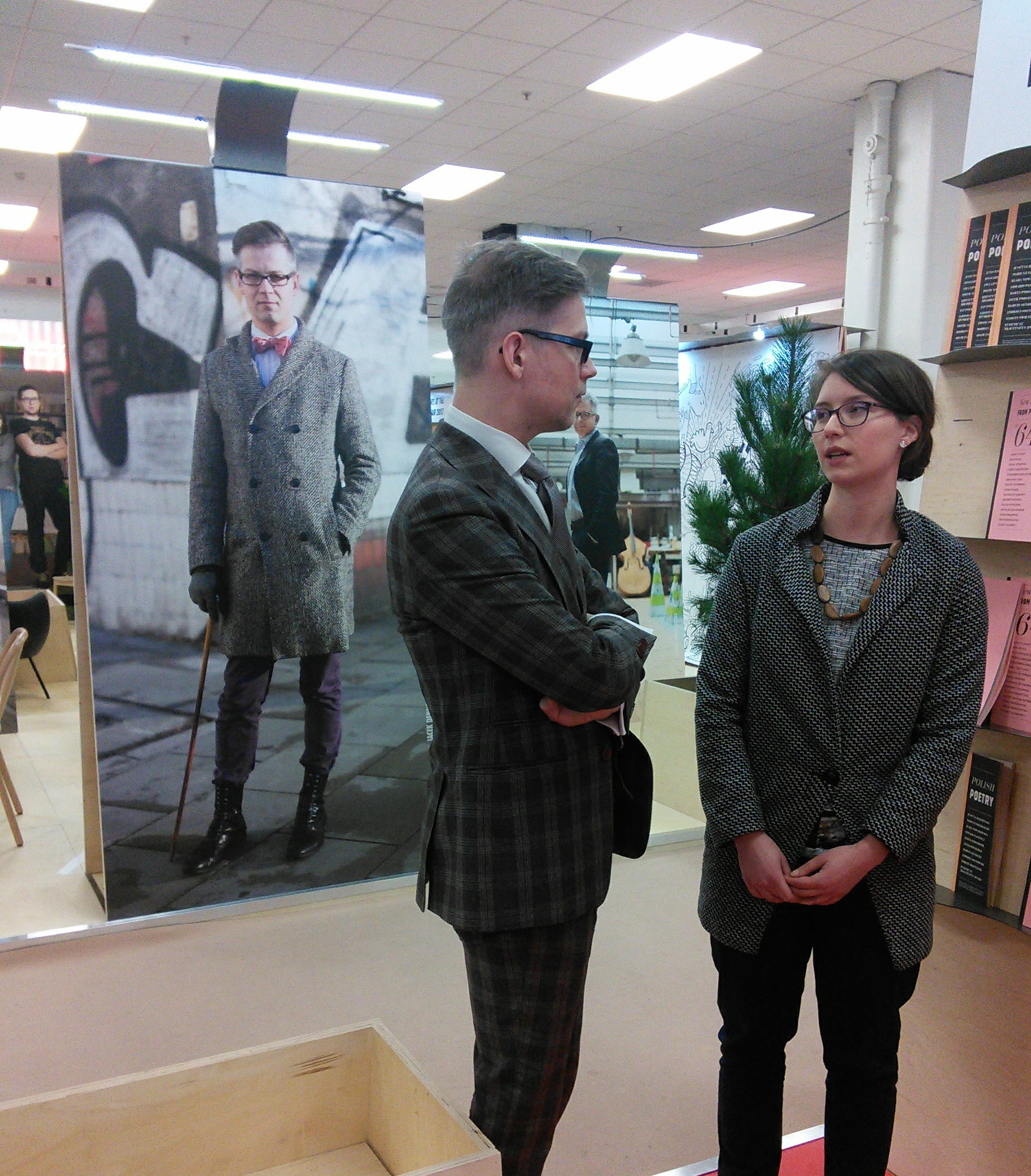In case you missed it, Asymptote has exciting news from the London Book Fair, plus the latest literary gossip from Argentina and Canada this week. Lots of new books to look out for, and many writers making waves in their communities. First stop: LBF!
Julia Sherwood, Editor-at-Large for Slovakia, sends us her notes from the recently concluded London Book Fair, where Polish literature had a big moment:
Over the past few years, Polish has become the second most widely spoken language in the UK, so it was high time for Londoners to get exposed to a massive dose of Polish literature. Several years of work by the British Council, the Polish Book Institute and the Polish Cultural Institute in London finally paid off as Poland was the market focus at this year’s London Book Fair, held from 13 to 16 March.
Polish writers kept popping up at readings and discussions—not just at the buzzing maze that is the Olympia conference centre, but also at venues all over London. However, the toast of the town was, without doubt, leading feminist author Olga Tokarczuk (Tok-ARCH-ook: TOK as in tick-tock, ARCH as in arch, OOK to rhyme with book, stress on the ARCH, to quote from the handy guide to pronouncing Polish writers’ names prepared by translator extraordinaire Antonia Lloyd-Jones). Apparently unfazed by her relentless schedule, Tokarczuk was always ready to answer probing questions with unfailing grace. Her conversation with novelist Deborah Levy at the London Review Bookshop sold out weeks in advance, and it must have been a real bonus for the author to be presented, ahead of its scheduled publication, with copies of her own latest book Flights, in Jennifer Croft’s English translation (excerpt here).

credit Elzbieta Piekacz, courtesy of Polish Book Institute
Discussing the role of history in 21st century Polish fiction, Tokarczuk—whom moderator Rosie Goldsmith introduced as the “Margaret Atwood of Central Europe“—declared: “Objective history doesn’t really exist. What is located in the archives is just a collection of facts; history is a projection, our interpretation.” London-based Libyan author Hisham Matar concurred, suggesting that “all writing about the past is vigorously about the present.” Science fiction writer Jacek Dukaj pointed out that films and books can shape our own memory of events, while poet, writer, and translator Jacek Dehnel explained that he doesn’t write non-fiction because in literature you often have to lie to make it more true.
In conversation with Marta Dziurosz, Dehnel talked about his sources of literary inspiration and the “creative jumble of Polish literature“. Rather than answering his translator Antonia Lloyd-Jones’s questions, crime writer Zygmunt Miłoszewski decided to interview her instead. At the children’s books display, Aleksandra Mizielińska and Daniel Mizieliński, whose phenomenally successful “Maps” have also been brought to English readers by Lloyd-Jones, needed just a few minutes to transform a blank wall into a wonderful animal mural. Meanwhile one hour was barely enough time to go over the title and opening sentence in this year‘s translation slam between Asymptote‘s Close Approximations Prize winner Sean Bye and Marta Dziurosz, held as part of the Book Fair’s International Translation Centre programme.

Jacek Dehnel, credit Julia Sherwood
On a flying visit to London, US-based poet and translator Piotr Florczyk collected this year’s Found In Translation Prize, awarded for his bilingual edition of Anna Świrszczyńska’s volume of poetry, Building the Barricades (Budowałam barykadę), published by Tavern Books. And there was much rejoicing at the news that Wioletta Greg and her translator Eliza Marciniak have been longlisted for the 2017 Man Booker International Prize for the poet’s delightful first novel, Swallowing Mercury.
The exhaustive and exhausting range of events included so much more than could possibly be crammed into this brief dispatch but, fortunately, poet Maria Jastrzębska was at hand to provide a detailed account on her live blog. To find out more about Polish literature, read the reviews of recently translated, and not yet translated, Polish books in “The Riveter”, a special edition of the Eurolit Network’s Riveting Reviews series; Antonia Lloyd-Jones’s recommendations for six Polish books that deserve to be translated into English; and the brief history of modern Polish literature by Stanley Bill on the British Council blog.
Assistant Editor Alexis Almeida phones in the scoop from Argentina:
On March 8th, International Women’s Day, there was a country-wide paro, or women’s strike, which over forty other countries around the world also participated in, as well as a march that culminated at the Plaza de Mayo and was joined by tens of thousands of people. Ni Una Menos, one of the feminist groups represented, issued an official statement, which called women of the world to “unite and organize a measure of force,” and made special mention of missing women and other gender-based violence occurring regularly across the country, among many other things. #NiUnaMenos and #VivaNosQueremos dominated the Twitter conversation around the event. The march ended with the reading of another document from Ni Una Menos, which referenced the statistic that one woman is killed every eighteen hours in Argentina.
Marina Yuszczuk, Tamara Tenenbaum, and Emilia Erbetta have launched a new press, Rosa Iceberg, and recently released it’s first two titles—Marina Yuszczuk’s Los arreglos and Cecilia Fanti’s La chica del milagro—at Casa Brandon in the Villa Crespo neighborhood. Paula Trama, a local singer-songwriter, performed at the launch celebration. Rosa Iceberg is currently one of the only presses in the nation with an all-female editorial board.
Casa Brandon also recently hosted Susy Shock, the self-identified “artista trans sudaca,” or South American trans artist (also singer, writer, and teacher), who performed along with Caro Bonillo, Sol Penelas, and Horacio Vazquez. Susy Shock regularly hosts the series, which takes place the first Friday of every month, and features a variety of trans-sexual artists whose performances are envisioned both individually and collectively. (Casa Brandon is a cultural center dedicated to promoting LGBTQ artists and events.)
Rosario, the largest city in the province of Santa Fe, recently hosted its inaugural editorial fair, which hosted local presses Ivan Rosado, Danke Editions, Neutrinos, and many others. Readers included Maja Morosano, Alejandra Benz, Marianela Luna, Cristian Molina, and Santiago Venturni.
And Blog Editor Madeline Jones has updates from the Canadian literary scene:
The 19th Blue Metropolis International Literary Festival, which will take place at the end of April, has announced an impressive lineup that speaks to its identity as a multilingual, multicultural event. The Grand Prix will be awarded to Indian writer Anita Desai, who writers in English, and other author guests include Imbolo Mbue, David Treuer, Francisco Goldman, and Barbara Gowdy.
Canadian writer Scaachi Koul’s first collection of essays came out this month (out in May in the US) to much fanfare. As a senior writer at Buzzfeed, Koul has become known for her acerbic essays on dark and serious topics and says of her style, “If I were a stronger person or a better person I would know how to deal with serious things without being a dick about it. But my only method is to be kind of an a- hole. This is my best attempt trying to make sense of a lot of it.” Koul was harassed last month on Twitter for attempting to recruit writers who were, “not white and not male.”
Journalist, essayist, and novelist Richard Wagamese, known for writing about returning to his Ojibwe culture after his parents abandoned him and his siblings when he was a toddler, died on March 10. Though Wagamese is not widely read outside of Canada, his life story is fairly incredible, and his name is honored among his fellow writers, including Louise Erdrich.
And if you’re in Quebec, it’s not too late to attend a talk later today about Canadian comparative literature or check out readings this weekend in various cities here.
Read More Dispatches from Around the World:

